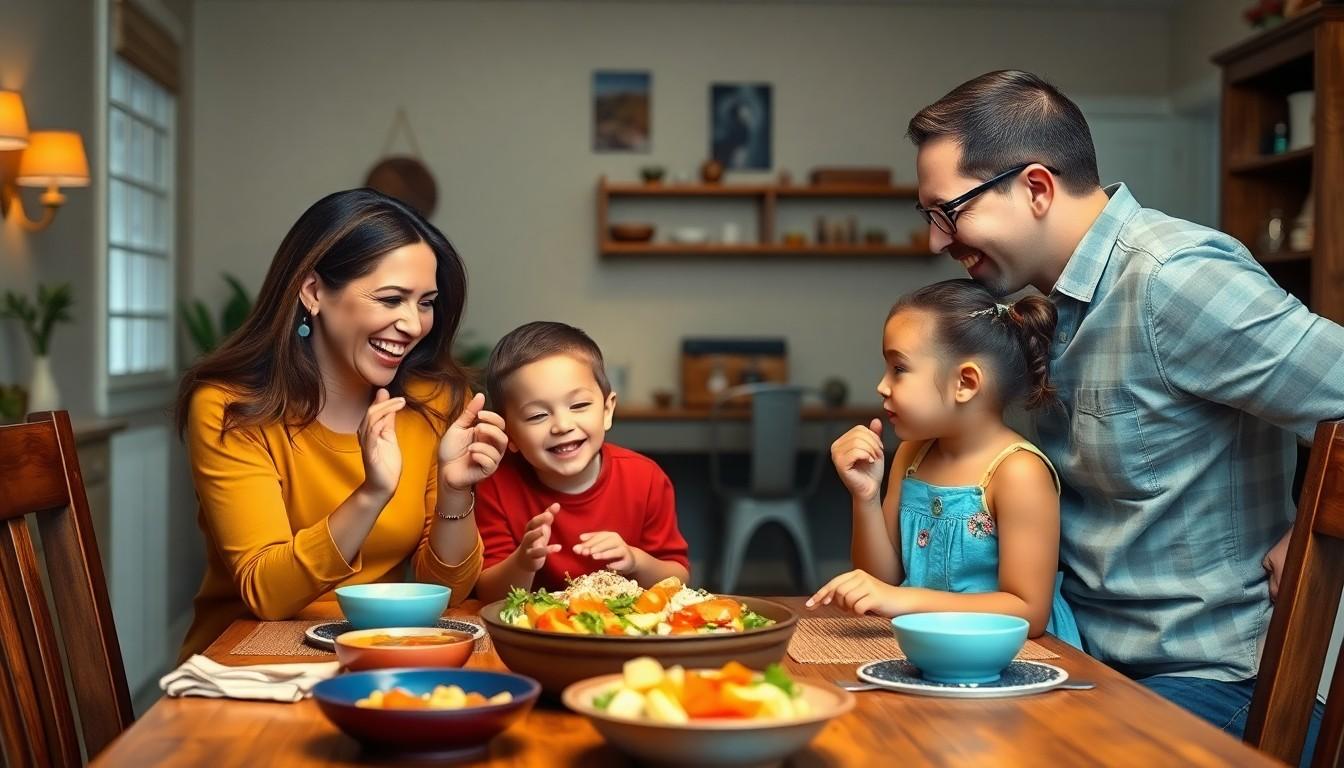Family relationships can be a wild ride, filled with laughter, love, and the occasional eye roll. Navigating the ups and downs isn’t just about surviving the holidays without a meltdown; it’s about building connections that last a lifetime. Healthy family dynamics can transform a chaotic household into a nurturing haven where everyone feels valued and understood.
Healthy Family Relationships
Healthy family relationships play a crucial role in individual well-being and overall family dynamics. These relationships contribute to a sense of belonging and stability, essential for emotional health.
Emotional Well-Being
Emotional well-being benefits dramatically from nurturing family relationships. When family members express love and support, individuals experience lower stress levels. Positive interactions foster resilience in challenging situations. Trust among family members enables open expression of feelings, reducing feelings of isolation. Stronger relationships become catalysts for happiness and emotional security. Families with healthy bonds often report improved mental health outcomes.
Communication Skills
Effective communication forms the backbone of healthy family relationships. Open dialogue empowers family members to share thoughts and feelings comfortably. Listening actively helps identify needs and concerns, supporting conflict resolution. Clear communication promotes understanding and strengthens connections among family members. Healthy exchanges foster collaboration and teamwork. Consistent interaction reinforces trust, enhancing overall family dynamics.
Building Healthy Family Relationships

Building healthy family relationships involves intentional actions and consistent efforts. Prioritizing these connections benefits overall well-being and creates a supportive family environment.
Establishing Trust
Trust stands as the foundation of healthy family relationships. Family members express their thoughts and feelings honestly, fostering an atmosphere of safety. Sharing experiences and being reliable strengthens these bonds. When individuals show vulnerability, it encourages others to do the same. Regularly engaging in activities together cultivates shared memories, reinforcing trust. Trust allows for open discussions about challenges, leading to collaborative solutions.
Promoting Open Communication
Open communication fosters understanding and connection among family members. Active listening plays a key role, as it allows individuals to feel heard and valued. Sharing feelings during family meetings or casual conversations enhances emotional intimacy. Encouraging questions and respectful discussions prompts deeper exploration of each other’s perspectives. When disagreements arise, addressing them calmly prevents further misunderstandings. Practicing empathy during dialogues cultivates a sense of acceptance and belonging.
Maintaining Healthy Family Relationships
Healthy family relationships require attention and effort. Engaging in meaningful interactions fosters stronger connections among family members.
Quality Time Together
Spending quality time together builds bonds that withstand challenges. Family dinners, outings, or game nights create opportunities for shared experiences. Regularly scheduling activities strengthens relationships and promotes open communication. Each member can take turns suggesting activities, fostering inclusivity. Additionally, creating traditions, such as monthly movie nights or yearly vacations, cultivates lasting memories. Enjoying each other’s company naturally enhances emotional intimacy.
Conflict Resolution Strategies
Conflict is a natural part of family life. Addressing issues calmly and constructively prevents resentment from building. First, acknowledging each person’s feelings helps create a safe space for dialogue. Practicing active listening ensures everyone feels heard and valued during discussions. Utilizing “I” statements promotes personal accountability without casting blame, aiding understanding. Seeking compromise showcases the importance of collaboration in finding solutions. Lastly, following up on resolved conflicts reinforces a commitment to healthier interactions.
The Role Of Family Activities
Family activities play a crucial part in nurturing healthy relationships. Engaging collectively helps strengthen bonds among family members through shared experiences. Whether planning birthday celebrations, reunions, or special gatherings, families can set the tone with printable party invites, making each occasion feel extra special while encouraging participation and excitement.
Shared Interests
Shared interests create opportunities for connection. Families that explore hobbies together, such as cooking or hiking, often deepen their relationships. Each member’s participation enhances their sense of belonging and promotes teamwork. Family members can discover new activities that everyone enjoys, fostering collaboration and enjoyment. These experiences cultivate a supportive atmosphere where everyone feels valued. Participating in regular family outings or projects encourages laughter and communication, essential elements for emotional growth. When families discover common passions, they build lasting memories that reinforce their relationships.
Routine Family Meetings
Routine family meetings establish a platform for open dialogue. Setting aside time regularly allows every member to express feelings and concerns. Family meetings foster transparency, which builds trust among members. Utilizing this time to discuss upcoming events or personal achievements encourages encouragement and support. Families can address conflicts in a calm and structured manner, preventing misunderstandings from escalating. Active participation during these discussions promotes accountability and collaboration. Such practices reinforce a culture of respect and understanding within the family unit.
Creating a Supportive Environment
Healthy family relationships are vital for fostering emotional well-being and creating a supportive environment. By prioritizing trust and open communication, families can navigate challenges and strengthen their bonds. Engaging in shared activities and maintaining traditions not only create cherished memories but also enhance emotional intimacy.
Addressing conflicts with empathy and understanding cultivates acceptance and belonging. Regular family meetings and quality time together further promote transparency and connection. Ultimately, investing in these relationships enriches each family member’s life, leading to a more harmonious and fulfilling family dynamic.




